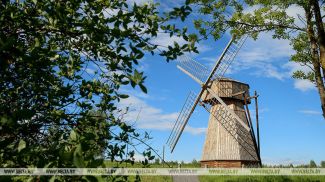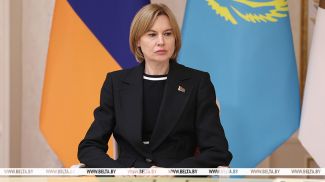INSK, 3 November (BelTA) – The money spent on the fence on the Polish-Belarusian border is the money spent on nonsense and mistakes of Poland's foreign policy, political analyst Vadim Borovik told BelTA.
The political analyst cited the facts about the construction of the fence on the Polish-Belarusian border. It is more than 186km long and 5.5m high. As it was reported, including by Polish official sources, 50,000 tonnes of steel structures and products were used for its construction. The project cost almost 1.6 billion zlotys, or $370 million. “Some experts argue that the fence could have been cheaper. Belarusian experts also took a look at the costs and think that the fence could have been built for less money. Not just a couple of millions of U.S. dollars cheaper, but three times cheaper! Experts question this sum. They took into account all things related to construction of such a fence, including the use of technical means, surveillance equipment, etc. Yet $370 million is still too big an amount for such a project. Hence the questions as to what the money was spent on and whether it was all spent on the fence. Again, according to our experts, such a fence with all the related work could have been built for $115 million,” he said.
In addition to the financial aspect (it is yet to be determined whether the construction works were financed by Polish taxpayers or the European Union) there is a question of serious environmental damage caused to Belovezhskaya Pushcha.
The construction of the fence was carried out by Poland in violation of international norms and rules. The construction of the fence was outside the legislative framework and was placed above environmental law, including legislation on environmental protection and regulations on the exchange of information on the environment; regulations on the protection of agricultural, forest and ecological lands; construction law; water law; geodesic and cartographic law; regulations on spatial planning and development.
“There have been violations of the norms of construction on agricultural and forest areas, including Belovezhskaya Pushcha. They were in such a hurry to build the fence that they ignored the environmental aspect altogether. Serious damage has been done to Belovezhskaya Pushcha where animals are dying. They needed roads to bring materials to the construction site. This is how the soil composition was essentially disturbed,” Vadim Borovik said. “It is trendy in Europe to be environmentally conscious. But who cares about environment and economy when politics comes first? No one. They violate everything they are ‘committed to'). Human rights, for example. We saw how they violated them at the border, dousing migrants with water cannons. They promote green economy and environmental protection. Just take a look at how they treat Belovezhskaya Pushcha. Europe claims it stands for ‘clean hands', but we see that there are issues with finances there, too.”
“Another question… Was it worth ruining relations with Belarus that did a lot for EU security. We acted as a shield against drug and weapons trafficking, we handled the migrant issue. We provided these services, one might say, absolutely for free on conditions of cooperation and mutual respect. Today, instead of building good neighborly relations and reaping benefits from them, Poland got involved in these geopolitical games and became a tool in someone else's game. They are pursuing this idea of a great Poland, which can have serious negative consequences for the Polish state. They spend a lot of money on fences nobody needs. They wanted the world to be freer and more open, to cooperate. Today they build fences and destroy the ecosystem of our region. Therefore, our neighbors should be ashamed. One must understand that the best way to ensure one's own security is to build normal, trust-based, good-neighborly relations. Belarus is committed to this. The main thing is to be heard, respected, and ready for a constructive dialogue,” the political analyst noted.
If a country is ready to cooperate with its neighbors in a constructive manner, respecting them and not creating problems for them, no fences will be needed,
Vadim Borovik believes. “But instead of being guided by common sense, of having a mutually respectful dialogue with Belarus, Poland has unilaterally taken a number of unfriendly actions against Belarus. We have felt it in full since 2020. As a result, they have created problems for themselves. I mean the money spent on this nonsense and mistakes of Poland's foreign policy,” he said.













